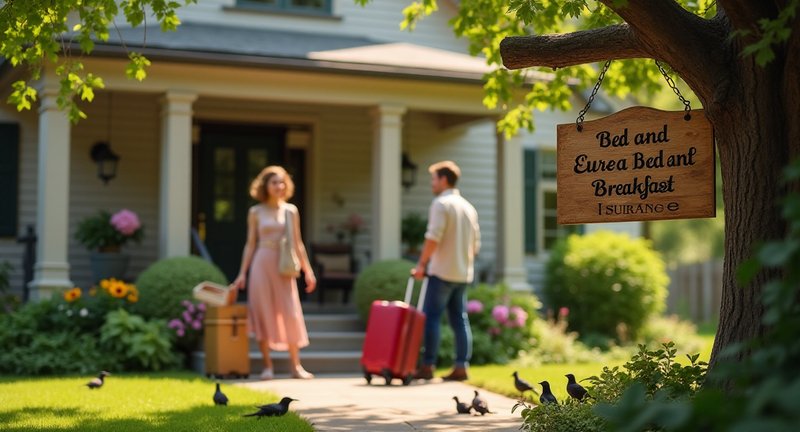Understanding Bed and Breakfast Insurance
When I first got into the bed and breakfast business, I had no idea how important Bed and Breakfast Insurance was. It’s one of those things you don’t really think about until you’re knee-deep in bookings, guests, and running your B&B. But trust me, this type of insurance is the safety net you didn’t know you needed.

So, what exactly does it cover? Well, it’s not just your run-of-the-mill home insurance. Here’s what I’ve learned from my own experience:
- Property protection: Your B&B isn’t just a home; it’s a business. If anything happens to the building, such as a fire or a flood, you want to be covered for repairs and replacements.
- Guest liability: Imagine a guest slipping on a wet floor or getting hurt on your property. Guesthouse business protection can help cover any potential medical bills or lawsuits.
- Business interruption: If something unforeseen happens like your kitchen catching fire and forcing you to close temporarily this coverage helps with the income you would have lost during that time.
- Contents coverage: It protects the items inside your B&B, like furniture, appliances, and even personal belongings, in case of theft or damage.
Now, I know the last thing you want to do is spend your evening reading through insurance policies. But it’s worth it. A small investment in B&b owner coverage can save you from a massive headache down the road.
The Essentials of Bed and Breakfast Insurance
When you run a charming bed and breakfast, there’s more to think about than cozy linens and gourmet breakfast spreads. As someone who’s been in the hospitality game for years, I can tell you that the right protection can make all the difference when life throws you the unexpected. Imagine a sudden plumbing disaster that turns your guest room into a swimming pool – yeah, it happens more than you’d think! That’s why having the right type of coverage is essential.

What should you consider? Let’s break it down:
-
Property Protection: Your beautiful property is your pride and joy, and it’s probably what keeps guests coming back. But natural disasters, fires, or break-ins don’t exactly RSVP before they arrive. Make sure you have coverage that protects the structure and contents of your B&B.
-
Liability Coverage: People can be unpredictable. Accidents happen, whether it’s someone slipping on the front steps or getting food poisoning from that farm-to-table breakfast you so lovingly prepared. Liability coverage shields you from potential lawsuits that could otherwise sink your business faster than you can brew your morning coffee.
-
Loss of Income Protection: Ever thought about what happens if you need to close your doors for repairs after a storm? The bills don’t stop, even when the bookings do. Having a plan that covers lost income keeps you afloat until you’re back up and running.
Don’t wait until you’re in the middle of a crisis to find out what you need. Do yourself a favor and get the right kind of protection before the unexpected knocks on your door – trust me, it will save you sleepless nights in the long run.
Understanding the Risks of Running a Bed and Breakfast
Running a bed and breakfast seems like a dream, doesn’t it? But let’s get real dreams have a funny way of turning into puzzles when you dive into the details. I learned this the hard way, and I’m here to spill a few truths.
First, you’re not just offering a cozy room. You’re running a mini-empire food, lodging, entertainment, the whole nine yards. The number of hats you’ll need to wear? Endless. And each one comes with its own set of headaches.
Then there’s the unexpected. One day you’re baking muffins, the next you’re fixing a broken pipe. Trust me, it’s never just about serving tea with a smile. Things break, guests cancel, and weather? It’s got a nasty habit of ruining the best-laid plans.
Speaking of guests, people are a gamble. You’ll meet charming folks, but sometimes you get the wildcards. The ones who stain your linens or throw impromptu parties. Be prepared for the unexpected, because in this business, ‘expect the unexpected’ is the golden rule.
Now, let’s talk about the legal maze. It’s not fun, but it’s necessary. There’s paperwork, local regulations, and keeping up with health codes. Oh, and if you think you can dodge liability, think again. Something goes wrong, and it’s your name on the line.
It’s not all doom and gloom, though. With every risk comes reward. The satisfaction of running a smooth operation is unbeatable if you’re willing to ride the bumps.
Protecting Your Business from Liability Claims
Let me tell you from experience, running a travel-related business is as much about preparation as it is about the experience you offer. But, what often slips under the radar is the importance of protecting your business from liability claims. One wrong move, and suddenly, you’re facing a legal storm that could sink all the hard work you’ve put in.
Now, when you think about risk, you might be focused on bad reviews or slow seasons, but let me stop you right there. The bigger threats come from where you least expect them slips, falls, or even a guest’s allergic reaction to the breakfast you served. To avoid that, safeguarding yourself with the right protection is crucial. Here are a few strategies I’ve found invaluable:
-
Clear Signage: Mark out any potential hazards in your property, especially slippery spots or areas under renovation. It’s a small step, but it works wonders.
-
Guest Agreements: Always have clear terms and conditions in writing. This isn’t just about booking policies, but also about what guests should expect in terms of responsibility.
-
Regular Maintenance: Routine checks on everything from the plumbing to the railing by the stairs can save you from a world of headaches. If something’s looking worn out, fix it before it breaks.
-
Local Laws: Know the local regulations like the back of your hand. This way, you’re always ahead of potential legal issues, instead of reacting when it’s too late.
Remember, the aim is to make your business as welcoming as possible while also keeping your bases covered. Trust me, peace of mind lets you focus on what really matters giving your guests the time of their lives, without any unexpected detours into a courtroom.
Coverage for Property Damage and Natural Disasters
Considering property damage and natural disasters, you really want to think ahead. Imagine waking up one morning, pouring yourself a coffee, and finding out that a storm the previous night tore off part of your roof. Not exactly the start to a serene day, right? It’s moments like these that make proper coverage more than just a checkbox.
You can’t control nature, but you can certainly prepare for its whims. A wildfire, flood, or even something as mundane as a broken pipe can set you back financially and emotionally. What I’ve learned over time is that it’s not about fearing the worst; it’s about ensuring you’re not left picking up the pieces alone when the unexpected happens.
I once spoke with a fellow owner who had a minor issue just a bit of water damage, nothing too alarming. But the aftermath? It ended up being a serious headache. You don’t realize how vulnerable your space is until something forces you to deal with it. And that’s why having the right protection in place isn’t just smart, it’s essential.
Make no mistake, the right policy covers more than the obvious things. From tree branches crashing through windows to heavy snow damaging your roof, you want something that covers the nitty-gritty, the surprises. Believe me, it’s always better to be over-prepared than under-insured.
Ensuring Guest Safety and Peace of Mind
As it relates to ensuring guest safety and peace of mind, it’s not just about clean linens and welcoming smiles. From my years running a cozy guesthouse, I’ve learned that true hospitality is about creating a sanctuary where people feel secure. Safety is often the unspoken promise every host makes to their guests, and that commitment shows in both visible and invisible ways.
Here’s how I’ve woven this into the fabric of daily operations:
-
Thorough Risk Assessments: Walking around my property, I try to look at it through a guest’s eyes scanning for loose railings, uneven floors, or any hidden hazards. Even the charming quirks of an old building can be a potential tripping point if not addressed.
-
Fire and Carbon Monoxide Safety: I’ve invested in top-of-the-line smoke detectors and carbon monoxide alarms. They’re the kind of thing you hope never goes off, but you feel better knowing they’re there. Regular checks are key because peace of mind is more than a one-time investment it’s ongoing care.
-
Clear Emergency Plans: Every room has a simple, visible emergency plan. This may seem like overkill for a small space, but trust me, in moments of panic, clear instructions can make all the difference.
-
Secure Locks and Lighting: When the sun sets, my focus shifts to lighting and locks. Well-lit paths to rooms and sturdy locks give guests the confidence to rest easy, knowing they’re safe.
At the heart of it all, ensuring guest safety isn’t about big gestures. It’s the small, thoughtful details that really tell your guests: ‘Relax. You’re in good hands.’
Financial Protection from Legal Disputes
When it comes to running a cozy bed and breakfast, you’re not just offering a room and a warm meal you’re stepping into a world where legal disputes can arise in unexpected ways. Trust me, I’ve been there. Whether it’s a guest’s misplaced item turning into a full-blown claim or a property dispute with a neighbor, these situations can catch you off guard. That’s why having a solid financial cushion to guard against legal battles is something I learned the hard way.
So how do you protect yourself?
- Liability coverage: First, ensure you’re covered for third-party claims. This isn’t just about someone slipping on your porch it extends to things like guest injuries or even damage to their belongings. You’d be surprised at the creative claims people can come up with.
- Property protection: Remember, your home is your business. Any damage caused by guests or natural events should be covered. I’ve seen small issues spiral into big legal headaches just because the right protection wasn’t in place.
- Employment disputes: If you hire staff, even just one helper, ensure you’ve got coverage for employment-related claims. Something as small as a misunderstanding about hours worked can lead to costly legal fees.
- Legal assistance add-ons: Some policies offer specific legal advice or defense coverage. It’s like having a lawyer on speed dial for those moments when you least expect trouble, but it shows up anyway.
Being proactive about legal disputes means you can focus on what you do best offering an unforgettable experience to your guests. And if you’re like me, the peace of mind that comes from knowing you’re financially protected is priceless.
Safeguarding Against Business Interruption
When you’re running a small hospitality business, like a cozy little bed and breakfast, there’s no room for complacency. Every day presents unique challenges, and when things go wrong, the impact can be immediate.
Picture this: a power outage right before your guests arrive. Or worse, a sudden leak that forces you to cancel reservations. These hiccups, while seemingly small, can spiral into bigger losses if you’re not prepared. I’ve seen it firsthand, and let me tell you, it’s not something you want to face without a safety net.
Protecting your business from interruption isn’t just about fixing problems as they come. It’s about anticipating them. It’s about having a plan when the unexpected knocks on your door. And trust me, the unexpected is always lurking.
Now, here’s the trick. Not all coverage is created equal. You need something tailored specifically to your business something that understands the quirks of running a home-like establishment. The kind of protection that ensures when things go sideways, you aren’t left scrambling.
Having a contingency plan for these moments is like having an extra layer of armor. Your guests expect seamless hospitality, but that’s only possible if you’ve shielded your business from the storms. So, let’s face it preparation isn’t just smart; it’s essential.
Comprehensive Coverage for Employee-Related Risks
With regard to running a small hospitality business, particularly one with a personal touch like a cozy inn or guesthouse, you learn quickly that protecting your team is just as important as keeping your guests happy. Comprehensive coverage for employee-related risks isn’t just a legal formality it’s the backbone of running a smooth operation.
I’ve seen firsthand how an unexpected incident can ripple through daily routines, turning what would have been a regular morning into a logistical nightmare. That’s where having the right coverage steps in, offering peace of mind when things take an unexpected turn.
Here’s why it matters:
-
Accidents happen: Let’s be honest whether it’s a simple slip in the kitchen or an incident on the property, your staff needs to be covered. Comprehensive policies make sure that medical expenses or lost wages don’t come out of your pocket.
-
Lawsuits can be costly: If a worker feels they’ve been wronged or injured due to negligence, you could find yourself facing legal action. Proper coverage can help mitigate those hefty legal fees and settlements.
-
Attracting and retaining talent: A well-insured business is more likely to attract and keep good employees. It signals to your team that you’re serious about their well-being and security.
-
Coverage beyond the usual: Sometimes the risks go beyond just accidents. What if an employee mishandles guest belongings? Comprehensive coverage also extends to liabilities like that, which many business owners overlook.
The right plan covers your employees but also secures your reputation. And trust me, once you’ve experienced a mishap that was handled smoothly thanks to solid insurance, you’ll never operate without it again.
Why Tailored Insurance is Critical for Your B&B
Why is tailored insurance critical for your B&B? From my experience running a cozy Bed and Breakfast, it’s a lesson I learned quickly generic insurance simply won’t cut it. That’s why Bed and Breakfast Insurance is not just a smart choice, it’s an absolute necessity. It protects your unique operation from the unexpected. Here’s why you should consider specialized coverage, and trust me, this is something you don’t want to overlook.
Tailored Coverage for Specific Risks
Think of all the potential mishaps that could arise:
- Guest injuries – Slippery floors, loose steps, you name it.
- Property damage – That antique mirror could fall, or worse, a kitchen fire.
- Theft or vandalism – Don’t underestimate petty crime in seemingly peaceful areas.
- Business interruptions – What if a natural disaster forces you to close temporarily?
A regular homeowner’s policy doesn’t account for these kinds of risks, but Guesthouse liability coverage does. It’s built with the specific nuances of running a B&B in mind, so you can focus on creating the perfect guest experience without worrying about “what if” scenarios.
Protect Your Assets and Reputation
Your B&B is more than just a property it’s your livelihood, and in many ways, your reputation. If something goes wrong, tailored insurance can cover the costs and shield your finances. Plus, it helps you sleep at night (and trust me, I’ve been there, tossing and turning).
Let me tell you from experience, there’s a real peace of mind knowing that no matter what, your B&B is protected. When you choose B&b proprietor’s insurance, you’re not just protecting a business, you’re safeguarding a lifestyle. And that, my friend, is priceless.
Common Claims Bed and Breakfast Owners Face
As a seasoned traveler and occasional host, I’ve seen the myriad challenges that innkeepers face. One of the most common claims revolves around property damage. Guests can be a bit too enthusiastic at times, leaving a wake of broken furniture or stained linens in their path.
Liability claims are another beast altogether. Imagine a guest tripping over a rug that seemed perfectly innocuous. Before you know it, you’re caught in a whirlwind of medical bills and legal jargon. It’s a stressful scenario that can make anyone’s heart race.
Let’s not forget about the ever-watchful eye of social media. One negative review can feel like a storm cloud hanging over your establishment. A disgruntled guest might take to the internet to air grievances, impacting your reputation in a blink.
In my experience, having a solid plan in place is crucial. Open communication with your guests can help mitigate misunderstandings. A little preemptive charm can work wonders in setting the right tone.
The importance of a thorough maintenance schedule cannot be overstated. Keeping your property in tip-top shape not only reduces risks but also ensures guests leave with fond memories. Happy guests are less likely to become a source of claims.
As a matter of fact, always consider the fine print in agreements with third-party platforms. They can sometimes create a maze of potential pitfalls.
Remember, being proactive is the name of the game. It’s not just about running a cozy retreat; it’s about creating a safe haven for you and your guests.
How Insurance Can Help in Case of Theft or Vandalism
Traveling to new places is a delightful adventure, but it can come with unexpected bumps along the way. Theft or vandalism can feel like a dark cloud hovering over what should be a bright experience. This is where insurance steps in like a trusty umbrella.
I remember a trip to a quaint village where I stayed in a charming inn. One evening, after a delightful dinner, I returned to find my camera missing. Panic set in, but thankfully, I had the right coverage. This small detail turned a potentially devastating moment into a mere inconvenience.
Insurance can be your guardian angel. It doesn’t just provide financial protection; it also offers peace of mind. Knowing that you’re covered against loss or damage allows you to enjoy your travels without constantly looking over your shoulder.

In my experience, claims can be easier than you think. I simply documented what had happened and reached out to my provider. Their support was invaluable, guiding me through the process. It’s like having a knowledgeable friend ready to help when the unexpected strikes.
Let’s not forget about the little things, too. Vandalism can happen anywhere, even in the most idyllic settings. If your property is damaged, having coverage ensures that repairs or replacements are handled swiftly, allowing you to focus on what really matters making memories.
So, whether you’re a frequent traveler or planning your first getaway, think about insurance as a smart companion on your journey. It’s one less worry in a world full of delightful surprises.
A Full Dissection of Bed and Breakfast Insurance
When diving into the world of accommodations, particularly the charming realm of quaint lodgings, there’s a crucial safety net that every owner must consider. From my experience running a cozy retreat, I’ve learned that protecting your investment is not just wise; it’s essential. Here’s a closer look at what this safety net should encompass:
-
Property Protection: Your establishment is more than just a building; it’s a treasure trove of memories. Coverage should include:
- Damage from natural disasters
- Theft of personal belongings
- Accidental damages caused by guests
-
Liability Coverage: Accidents happen, even in the coziest of settings. If a guest takes a tumble down the stairs or has an unfortunate encounter with a hot tub, you’ll want to be safeguarded against claims. Consider:
- Medical expenses for injuries
- Legal fees if litigation ensues
-
Business Interruption: Should your establishment face an unforeseen closure, this component ensures you won’t be left in a financial lurch. It can cover:
- Loss of income during repairs
- Ongoing expenses even when you’re not hosting guests
-
Personal Liability: Sometimes, it’s the little things that can catch you off guard. Having a safety net for personal actions, like mishaps during a guest’s stay, is crucial.
-
Customization: Every lodging has its unique quirks. Don’t hesitate to tailor your coverage to fit your specific needs and circumstances.
In wrapping up, ensuring that you have the right protections can save you from sleepless nights and financial woes. It’s an investment that pays dividends in peace of mind.
Managing the Unique Risks of Bed and Breakfast Operations
Concerning running a bed and breakfast, navigating the peculiar risks inherent in this hospitality niche can feel like tiptoeing across a tightrope strung over a bustling street. My experiences have taught me that managing these unique challenges is not just about hospitality; it’s about strategic foresight and preparedness. Here are a few lessons I’ve gathered along the way:
-
Guest Safety: The safety of your guests should always be the priority. Consider installing smoke detectors, security cameras, and adequate lighting in common areas. A safe haven is what travelers are looking for.
-
Property Maintenance: Regular inspections of plumbing, electrical systems, and heating can prevent minor issues from blossoming into major disasters. Trust me; no one wants to deal with a flooded room in the middle of summer!
-
Liability Considerations: Always be aware of your liabilities. From slips and falls to food allergies, understanding potential pitfalls can save you from legal headaches down the line.
-
Insurance Protection: While we’re not using that specific phrase, it’s crucial to have comprehensive coverage that protects your establishment against various risks from property damage to guest injuries.
-
Emergency Preparedness: Having a solid emergency plan is paramount. Ensure that all staff members know what to do in the case of an incident, whether it’s a fire, a medical emergency, or a severe weather event.
In my journey, I’ve found that embracing these aspects not only shields your business but also enhances the overall guest experience. After all, a well-managed B&B isn’t just about comfy beds; it’s about creating a home away from home where guests feel secure and valued.
The Importance of Coverage for Special Events
In the context of hosting special events at your charming getaway, having the right coverage is like ensuring a cozy blanket on a chilly night. It wraps you in comfort, allowing you to focus on what truly matters: creating unforgettable memories for your guests.
I remember organizing a whimsical wedding at my inn. Every detail sparkled with anticipation, but I was acutely aware that things could go awry. Perhaps a sudden rain shower would dampen the festivities, or maybe a guest would accidentally spill red wine on the pristine white linens. Having coverage meant that I could breathe a sigh of relief, knowing I was protected from unexpected financial storms.
This coverage isn’t just about safeguarding your property; it’s about peace of mind. Imagine hosting a festive family reunion or a vibrant birthday bash. The laughter, the clinking of glasses, the stories shared all of these moments are invaluable. But if something unexpected happens, you want to ensure you’re not left footing a hefty bill.
So, let’s not overlook the details! Every special event comes with its own set of unique risks. Whether it’s a wayward firework or an overzealous dance floor, your coverage should be as versatile as the events you host.
Trust me, investing in the right protection allows you to immerse yourself in the joy of the occasion. It lets you focus on those magical moments rather than worrying about what could go wrong. After all, life is too short not to celebrate every special occasion with flair!
What You Should Know
Is a bed and breakfast tax deductible?
Yes, expenses related to running a bed and breakfast can be tax deductible, but specific criteria must be met. Owners can typically deduct operating costs such as utilities, maintenance, and supplies. It’s essential to keep detailed records and differentiate between personal and business expenses. Additionally, the IRS allows for depreciation on the property, which can further reduce taxable income. Consulting with a tax professional familiar with hospitality businesses can ensure that you’re maximizing your deductions and complying with tax regulations.
What is a bed and breakfast plan?
A bed and breakfast plan typically refers to a business model in the hospitality industry where guests pay for overnight accommodations along with breakfast included in the price. This plan focuses on providing a cozy, personalized experience, often in a residential setting. The owners may prepare homemade meals, offering a more intimate alternative to traditional hotels. This model attracts travelers looking for a unique experience, combining comfortable lodging with a welcoming atmosphere and locally inspired breakfast options.
What does bed and breakfast included mean?
‘Bed and breakfast included’ means that the cost of the accommodation covers both the lodging and breakfast for the guests. This pricing structure is common in bed and breakfast establishments, where the owners often serve breakfast on-site. It offers a convenient option for travelers who want to start their day with a meal without needing to leave the property. The breakfast provided can range from simple continental options to elaborate homemade dishes, enhancing the overall guest experience.
What is innkeepers insurance?
Innkeepers insurance is a specialized type of insurance designed for owners of bed and breakfast establishments or inns. This coverage protects against various liabilities, including property damage, guest injuries, and potential lawsuits. It typically includes general liability insurance, property coverage, and sometimes business interruption insurance. This type of insurance is crucial for B&B owners, as it safeguards their investment and provides financial protection in the event of accidents or unforeseen circumstances that could impact the business.
What is the bed and breakfast rule for taxes?
The bed and breakfast rule for taxes generally refers to specific tax guidelines that allow owners of bed and breakfasts to deduct certain expenses related to their business. For instance, if a property is used primarily for business purposes, owners can often deduct a portion of their mortgage interest, property taxes, and maintenance costs. However, if the property is also used for personal purposes, deductions may need to be prorated. It’s important to consult with a tax advisor to navigate these rules effectively.
Is a bed and breakfast passive income?
Owning a bed and breakfast can provide passive income, but it often requires active involvement from the owner. While the rental income from guests might seem passive, managing a B&B involves significant daily tasks, including check-ins, housekeeping, and meal preparation. Therefore, while it can generate income with relatively less effort compared to a traditional job, it still demands considerable attention and work, especially in maintaining high guest satisfaction and managing operational challenges.
What are the disadvantages of a B&B?
While bed and breakfasts can be rewarding ventures, they come with several disadvantages. One of the main challenges is the workload, as operating a B&B involves daily tasks like cleaning, cooking, and managing bookings. Additionally, inconsistent income can be a concern, especially in off-peak seasons. There may also be regulatory hurdles and insurance costs to consider. Owners must be prepared for the demands of customer service and the potential for guest-related issues, which can add stress to the operation.
What is the difference between Airbnb and bed and breakfast?
The primary difference between Airbnb and a bed and breakfast lies in the experience and level of service provided. Airbnb is a platform that allows homeowners to rent out their properties or rooms for short stays, often without the personal touch of traditional hospitality. In contrast, a bed and breakfast usually involves owners living on-site and providing breakfast and other amenities, creating a more intimate atmosphere. While both options offer lodging, B&Bs typically emphasize personalized service and unique breakfast offerings.
How long can you stay in a B&B?
The duration of stay in a bed and breakfast can vary depending on the establishment’s policies. Most B&Bs cater to short-term stays, often accommodating guests for a few nights to a week. Some may have minimum stay requirements, particularly during peak seasons or special events. However, it’s essential to check with the specific B&B for their policies, as some may offer long-term stays or discounts for extended visits, especially in slower seasons when occupancy rates are lower.
Can you write off breakfast?
In a bed and breakfast setting, breakfast costs can often be considered a deductible business expense. If the breakfast is included in the lodging price, it is typically viewed as part of the operational costs. However, it’s crucial to maintain proper records of food purchases and associated expenses. Consulting a tax professional can help clarify what is deductible and ensure compliance with IRS regulations, especially if the property also serves personal meals or has mixed-use situations.
Is an Airbnb a good tax write-off?
An Airbnb can offer various tax write-off opportunities for hosts, similar to those available to traditional rental property owners. Expenses such as mortgage interest, property taxes, maintenance, and cleaning supplies may be deductible. However, hosts must track the portion of the property used for rental versus personal use, as only the rental portion qualifies for deductions. Keeping detailed records and receipts is essential. Consulting a tax advisor can help maximize these deductions and ensure compliance with tax laws.











I love how you emphasize that true hospitality extends beyond just a warm welcome. Creating a safe sanctuary for guests is something I value highly as well! Your focus on thorough risk assessments resonates deeply with me. I often find myself playing detective, searching for potential hazards that might go unnoticed. It’s so true that the charm of an older building can sometimes be its downfall! Investing in top-notch safety devices like smoke detectors is a must; I feel the same way about ensuring they’re checked regularly. It’s those small, thoughtful touches that let guests know they’re in safe hands. And having clear emergency plans is a brilliant idea especially in moments of panic, clear instructions can be a lifesaver! Your approach to guest safety not only protects them but also enhances their experience. Thanks for sharing these wonderful insights; they’ve inspired me to elevate my own practices!
Wow, your perspective on preparing for natural disasters really hits home! I once had a friend who faced a similar situation when a tree branch crashed through their roof after a storm. Talk about a rude awakening! It’s so true that you can’t control nature, but you can definitely take steps to protect your property. Your experience highlights how having the right insurance is essential. I’ve also learned that it’s crucial to have a plan in place, like ensuring you have emergency contact numbers handy and knowing your local resources. It’s funny, but sometimes we think we’re invincible until something unexpected happens. I’m all for being over-prepared! After all, it’s those little precautions that can save us from a mountain of headaches later. Thanks for sharing your thoughts; they really inspire me to review my own coverage!
I completely agree with your insights on the importance of preparing for liability claims in the travel industry! As someone who’s also ventured into running a guesthouse, I’ve learned the hard way that even the smallest oversight can lead to significant problems down the road. Your suggestions about clear signage and guest agreements are spot on! I remember a time when we had a slippery spot by the pool that I neglected to mark properly. One guest slipped, and thankfully they weren’t hurt, but it opened my eyes to how critical these precautions are. Regular maintenance is another key point. I’ve become a bit of a DIY enthusiast, ensuring that everything from the plumbing to the outdoor furniture is regularly checked and repaired. And knowing local laws? That’s a game-changer! It makes a huge difference when you can proactively manage risks instead of reacting to them later. Your reminder about making the business welcoming while protecting it is a balancing act I st
Wow, I couldn’t agree more with your observations about the challenges of running a B&B! It’s definitely not all baking muffins and chatting with guests. I’ve learned that multitasking is my new best friend. Your description of wearing multiple hats hits home for me, as I’ve had to juggle everything from fixing broken pipes to navigating local regulations! The unpredictability of guests adds a whole new layer to the experience, too. Some guests are delightful, while others can turn your perfect weekend into a mini-crisis. It’s a wild ride, for sure! But like you said, the rewards of running a successful B&B make it all worthwhile. The joy of hosting and creating memorable experiences for guests keeps me going, despite the bumps along the way. Thanks for sharing your candid take on this adventure!
Your point about the unpredictability of running a B&B is spot on! Just last month, I had a surprise plumbing disaster that left my guest room looking like a scene from a disaster movie. Having the right coverage made all the difference during that chaotic time! I love how you emphasize the importance of property protection and liability coverage. It’s so crucial to have that safety net when something goes wrong like an unexpected storm or an unfortunate accident. Plus, your reminder about loss of income protection really resonates. It’s easy to forget about the bills piling up when you can’t operate your business. Getting ahead of these issues with proper coverage has saved me countless sleepless nights. Your insights are truly appreciated!
I completely relate to your experience with Bed and Breakfast Insurance! When I first opened my B&B, I thought I could wing it without proper coverage, and boy, was I wrong! The peace of mind that comes from knowing you’re protected from property damage and guest liability is priceless. Your breakdown of what this insurance covers is super helpful for anyone starting in this business. I wish I had known how critical it is, especially for covering unexpected costs like a burst pipe or a pesky lawsuit from a guest mishap. It’s easy to overlook until you’re knee-deep in a crisis. Thanks for sharing your insights it’s a valuable reminder to invest in the right protection upfront!